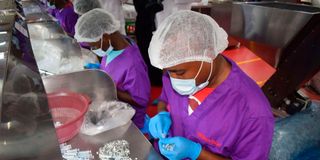Scientists studying the new Mpox clade 1 strain

Clade I has since mutated to Clade 1b in Africa.
What you need to know:
- There are two different clades of the virus, including Clade I and II.
- Clade II is responsible for the global outbreak in 2022 and in countries in Europe and North America, regions not endemic to the disease.
A team of scientists has started a new study to combat the rapidly spreading Clade 1 strain of the Mpox virus, with the goal of guiding vaccine development.
The scientists at the La Jolla Institute for Immunology (LJI) are also studying the effects of the mutated Clade 1 mpox virus on children and the elderly, as well as how new vaccines can enhance the body's ability to defend itself against it.
There are two different clades of the virus, including Clade I and II. Clade II is responsible for the global outbreak in 2022 and in countries in Europe and North America, regions not endemic to the disease. Experts say that Clade I is more severe than Clade II and is classified as a high consequence infectious disease.
According to the US Centers for Disease Control and Prevention (CDC), Clade 1 mpox is a virus from the same family as smallpox, a disease that cause a rash illness and can range from mild and localised to severe and widespread.
Clade I has since mutated to Clade 1b in Africa. The current outbreak has mainly affected African countries, with more than 14,000 cases being reported and approximately 456 deaths in 15 African countries. Sweden and Pakistan have also reported cases of Clade Ib.
Kenya has so far reported two cases of mpox out of a sample size of 40 and has screened over 400,000 travellers at various entry points across the country.
The study follows a health warning from the CDC in 2022 about serious health complications from a severe case of mpox in people who are immunocompromised because of human immunodeficiency virus (HIV) or other diseases, older adults, and children.
Prof Alessandro Sette and Prof Alba Grifoni are leading the investigation into how human T cells, a type of white blood cells responsible for fighting infections target viruses to prevent severe disease and how the immune system recognises the clade 1 mpox strain. Their laboratories are working to accelerate the development of new mpox vaccines by analysing patient samples and measuring vaccine responses.
Prof Sette explains that because mpox is a large DNA virus, it is less likely to mutate in T-cell epitopes than small RNA viruses such as SARS-CoV-2 and influenza viruses. This means that even if mpox mutates, human T cells should still recognise some of the key epitopes that remain unchanged between the original strain and the mutated clade 1 strain.
The research by these scientists could provide important insights for vaccine and therapeutic use as health officials combat the growing mpox outbreak in the Democratic Republic of Congo (DRC) and in more than a dozen African countries, including Kenya. It is hoped that their work will guide future mpox vaccine development and protect a broad group of patients.
Meanwhile, Kenya is one of five countries in the contnent to receive 50,000 doses of ACAM2000 mpox vaccine donated by Emergent BioSolutions through Direct Relief, in partnership with the World Health Organization (WHO) and the US government. Other countries receiving doses include the DRC, Burundi, Rwanda, and Uganda.
The ACAM2000 vaccine is intended primarily for use in a bioterrorism emergency and is indicated for active immunisation against smallpox disease in persons at high risk of smallpox infection.
The WHO and the African CDC have declared the outbreak a public health emergency of international concern, with the latter reporting an acute shortage of vaccines in the region. Only about 200,000 doses have been procured, and they say that there’s a need for more than 10 million doses.
As of now, there is no specific treatment approved for mpox. Vaccination remains the primary method of prevention.



